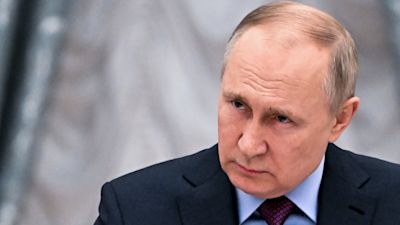President Putin puts Russia's nuclear deterrent forces on high alert as tensions mount

From his post in Kyiv, Europe Editor James Mates has the latest on the Russian invasion of Ukraine
President Vladimir Putin has ordered Russian nuclear deterrent forces be put on high alert, as tensions with the West mount over his invasion of Ukraine.
Speaking at a meeting with his top officials, the Russian president claimed leading NATO powers had made “aggressive statements” as well as imposing hard-hitting financial sanctions against Russia and leading officials.
Putin ordered the Russian defense minister and the chief of the military’s General Staff to put the nuclear deterrent forces in a “special regime of combat duty.”
“Western countries aren’t only taking unfriendly actions against our country in the economic sphere, but top officials from leading NATO members made aggressive statements regarding our country," Putin said in televised comments.
The order raises the threat Russia's invasion of Ukraine could lead to the use of nuclear weapons.
Prior to the invasion four days ago, Russia's strategic nuclear forces held exercises overseen by Putin.
The drills saw missiles launched from ships, planes, and submarines, as the Russian President watched on from a situation room in the Kremlin alongside Belarus's leader, Alexander Lukashenko.
Listen to the ITV News podcast What You Need To Know, for the latest expert analysis on Ukraine
Russia maintains around 6,000 nuclear warheads, the most of any country in the world. NATO members France, the UK, and the US are also nuclear armed.
On Sunday evening, Boris Johnson said President Putin putting Russia’s nuclear deterrent forces on high alert was “a distraction from the reality of what’s going on in Ukraine”.
The prime minister said Mr Putin's actions were linked the fact that his forces were meeting with “more resistance than the Kremlin had bargained for”. Mr Johnson also cast doubt on negotiations between Russian and Ukrainian delegations to try to resolve the crisis.
The Russian leader this week threatened to retaliate harshly against any nations that intervened directly in the conflict in Ukraine.
Currently no NATO troops are on the ground in Ukraine, but the alliance is sending support through weapons and aid to the country.
Analysis from Neil Connery, ITV News Correspondent, Moscow
President Putin was determined to get the world to pay attention this afternoon when he announced he was putting Russia’s strategic nuclear forces on special alert.
After the strength of the international community’s response over the past 48 hours with sanctions and other measures, it maybe the case that he is wondering whether he has incorrectly gambled with his Ukraine invasion.
Many had expected Russian forces to move much quicker than they are and have underestimated the potency of the Ukrainian resistance.
So as Russia’s president sits in the Kremlin contemplating a potentially collapsing Russian economy and the Russian Ruble going through the floor when the markets open tomorrow, he turned to the card that never fails to deliver.
Meeting with Russia’s defence minister and military chief of staff, the 69-year-old’s frustration at the position he finds himself in felt almost palpable.
Just last weekend, Russia conducted exercises with nuclear-capable cruise missiles. They normally happen each autumn but the timing was a clear message to Western countries not to interfere with Russia’s invasion of Ukraine.
On Thursday, when his forces started the attack, he had a clear warning to any nation contemplating responding to Russia’s actions: “the consequences will be such as you have never seen in your entire history".
And so, on day four of this invasion, he has decided to remind the world in the clearest terms possible that Russia has the world’s largest nuclear arsenal with just under 4,500 warheads.
The timing of this maybe linked to negotiations between a team from the Ukrainian government and the Russians on the Belarus border.
Maybe President Putin feels now is the time to try to exert maximum pressure on any such deal to get the best terms he can. If so, early indications from Kyiv suggest he maybe disappointed. But to stop this war all sides will need to compromise - and fast - given the danger of the situation escalating even more out of control.